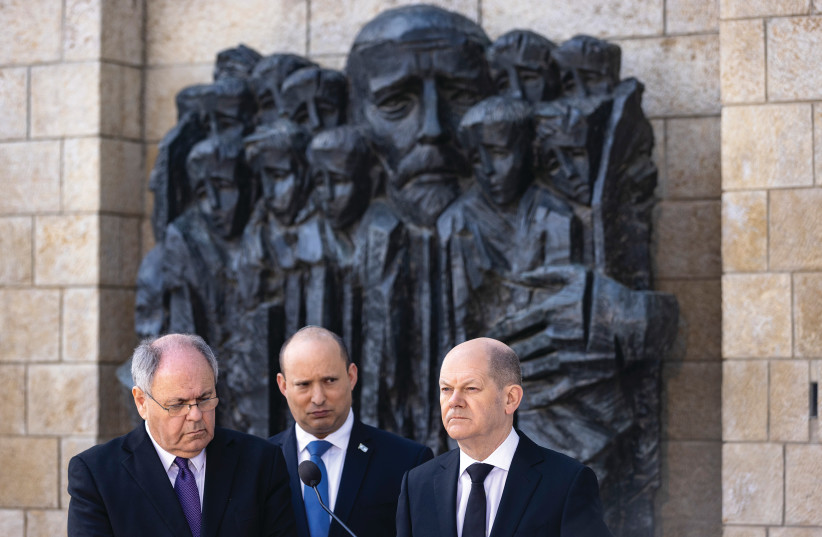Israel has a moral obligation to try to bring an end to the human suffering in the war in Ukraine, Prime Minister Naftali Bennett said on Sunday as he continued his effort to mediate.
A day after the shuttle diplomacy efforts, which saw Bennett flying to Moscow to meet with Russian President Vladimir Putin, and then to Berlin, to meet with German Chancellor Olaf Scholz the same day, Bennett spoke with Ukrainian President Volodymyr Zelensky on Sunday, for the third time in 24 hours, and then Putin, less than a day after departing the Kremlin.
Read more on the Russia-Ukraine War:
Foreign Minister Yair Lapid plans to fly to Riga, Latvia, to meet with US Secretary of State Antony Blinken on Monday, to discuss Russia’s war on Ukraine and the Iran nuclear deal.
“I went to Moscow and Berlin to try to help bring a dialogue between all the sides, with the blessing and encouragement of all the players,” Bennett said at the start of Sunday’s cabinet meeting.
Bennett said that “even if the chances are not great,” he sees it as Israel’s “moral duty to make every attempt,” because he has good contacts with both sides of the conflict.”

“The situation on the ground is not good,” he added. “The human suffering is great and can become even greater if things continue on the current path. There are Israelis who need to come home and Jewish communities in distress that need help.”
Paraphrasing a well-known rabbinic adage that “as long as the candle is burning, there is time to fix things,” Bennett said: “As long as the candle is burning – we must try, and maybe we can still act.”
In addition, Bennett said that Israel is preparing for a large wave of aliyah in light of the war.
“This is a challenge for the State of Israel, but it is a challenge that we withstood in the past, time after time,” he said. “Moments like this, in which the world is facing an upheaval and Jews are no longer safe where they are, remind all of us how important it is that there is a home for Jews, whoever they are, and how important it is that we have the State of Israel.”
Bennett also spoke with Scholz less than a day after their meeting in Berlin, and called French President Emmanuel Macron for the second time in a day.
Bennett and Zelensky spoke twice after the meeting with Putin on Saturday, and the Ukrainian president was informed ahead of the meeting as well.
Bennett met with Scholz over dinner for an hour and a half late Saturday night, during which they discussed the war in Ukraine.
ZELENSKY ASKED asked Bennett to try to organize a summit with Putin in Jerusalem before Russia invaded his country, and has since asked the Israeli prime minister to mediate between Ukraine and Russia.
Bennett and Putin discussed the war in Ukraine, including the situation of Israelis and Jewish communities as a result of the conflict, a diplomatic source said.
The Conference of Presidents of Major American Jewish Organizations commended Bennett’s efforts, saying that he “demonstrated Israel’s desire and core Jewish principle, to show humanitarian compassion – rachmanut – for the millions of Ukrainians, Jews and non-Jews alike, who are victims of the fighting... We join him and the world community in praying for a swift and peaceful end to the conflict.”
Putin and Bennett also agreed to continue the deconfliction mechanism in Syria. Jerusalem coordinates with Moscow before airstrikes on Iranian targets in Syria, where the Russian Army is the dominant force.
Since Russia invaded Ukraine, Israel has been trying to balance the national security importance of coordination with Russia in Syria compared with Israel’s strongest strategic alliance, that with the US and support for democracy and international order.
Israel condemned Russia’s invasion of Ukraine through Foreign Minister Yair Lapid and a vote in the UN General Assembly, but Bennett has been reticent to say anything about Russia. In his recent statements he has expressed support for the Ukrainian people and called for negotiations.
The Israeli prime minister was the first leader of a democracy to meet with Putin since Russia invaded Ukraine 10 days earlier.
Bennett coordinated his trip to Moscow in advance with the US, France and Germany. Turkey was also updated, as Bennett’s flight route went over its territory.
Bennett departed Israel early Saturday morning for the trip, which was planned after he spoke with Putin on Wednesday about the war in Ukraine.
Bennett and Building and Construction Minister Ze’ev Elkin, who served as translator, are both Shabbat-observant. Flying on Saturday indicates that there was an urgent national security need.
Elkin has translated Putin for prime ministers in meetings for more than a decade. The Kharkiv-born minister has a brother in Ukraine, and was offered a Ukrainian cabinet post – in jest – when they met after Zelensky was elected president of Ukraine in 2019.
